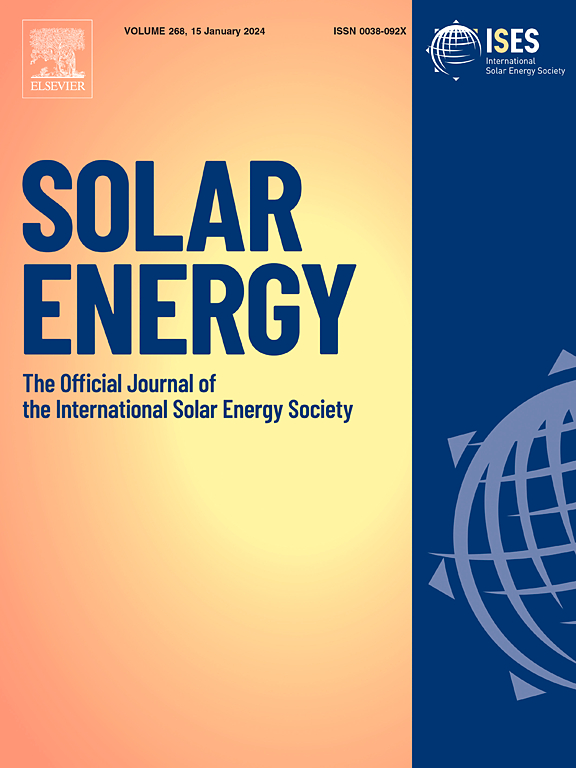Predictive and disturbance rejection control for parabolic trough solar field under multiple disturbances and operating points using machine learning and nonlinear disturbance observer
IF 6
2区 工程技术
Q2 ENERGY & FUELS
引用次数: 0
Abstract
This paper presents a new machine learning predictive and disturbance rejection control scheme for the parabolic trough solar field (PTSF) system which suffers from multiple field disturbances, such as direct normal irradiance variations, heat transfer fluid flow fluctuations, and atmosphere temperature changes. The dynamic model and the disturbance response characteristics of the PTSF system are first investigated to facilitate the controller design. Then, a recurrent neural network (RNN) model is developed to approximate the nonlinear dynamics of PTSF system using the input–output data. Thereafter, a novel RNN-based nonlinear disturbance observer (RNN-NDOB) design is presented to handle multiple disturbances in the PTSF system. An NDOB-assisted RNN-based MPC (NDOB-MPC) is also developed to regulate the PTSF outlet temperature to track the set-point under multiple field disturbances and operating point switching conditions. Finally, a series of simulations on the PTSF system are presented to validate the RNN modeling accuracy, RNN-NDOB disturbance rejection performance, and closed-loop control performance of the proposed NDOB-MPC scheme, respectively. It shows that RNN can approximate the nonlinear dynamics of PTSF system well, and multiple field disturbances can be rejected by RNN-NDOB in real time. Furthermore, the proposed NDOB-MPC scheme exhibits superior control performance compared with two benchmark controllers, a well-tuned two-degree-of-freedom PID controller and a standard linear model predictive control. This superiority was validated across three challenging closed-loop control cases, i.e., step-type set-point tracking with input disturbance, regulation under parameter uncertainty and solar irradiance variations, and operation point switching amidst multiple simultaneous disturbances. The significant performance improvement of the proposed control scheme in these challenging cases demonstrates its promising prospect for enhancing solar energy utilization.
基于机器学习和非线性扰动观测器的多扰动工况下抛物槽太阳场预测与抗扰控制
针对抛物槽式太阳场(PTSF)系统,提出了一种新的机器学习预测和抗扰控制方案,该方案可用于直接法向辐照度变化、传热流体流动波动和大气温度变化等多重场干扰。首先研究了PTSF系统的动态模型和扰动响应特性,以便于控制器的设计。然后,利用输入输出数据建立递归神经网络(RNN)模型来逼近PTSF系统的非线性动力学。在此基础上,提出了一种新的基于rnn的非线性扰动观测器(RNN-NDOB)设计,用于处理PTSF系统中的多重扰动。本文还开发了一种ndob辅助rnn的MPC (NDOB-MPC),用于在多场干扰和工作点切换条件下调节PTSF出口温度以跟踪设定点。最后,在PTSF系统上进行了一系列仿真,分别验证了RNN建模精度、RNN- ndob抗扰性能和NDOB-MPC方案的闭环控制性能。结果表明,RNN能很好地逼近PTSF系统的非线性动力学,并能实时抑制多场干扰。此外,与两种基准控制器、二自由度PID控制器和标准线性模型预测控制相比,所提出的NDOB-MPC方案具有更好的控制性能。这一优势在三个具有挑战性的闭环控制案例中得到了验证,即具有输入干扰的阶跃式设定点跟踪,参数不确定性和太阳辐照度变化下的调节,以及多个同时干扰下的工作点切换。在这些具有挑战性的情况下,所提出的控制方案的性能显著提高,表明其在提高太阳能利用方面具有良好的前景。
本文章由计算机程序翻译,如有差异,请以英文原文为准。
求助全文
约1分钟内获得全文
求助全文
来源期刊

Solar Energy
工程技术-能源与燃料
CiteScore
13.90
自引率
9.00%
发文量
0
审稿时长
47 days
期刊介绍:
Solar Energy welcomes manuscripts presenting information not previously published in journals on any aspect of solar energy research, development, application, measurement or policy. The term "solar energy" in this context includes the indirect uses such as wind energy and biomass
 求助内容:
求助内容: 应助结果提醒方式:
应助结果提醒方式:


